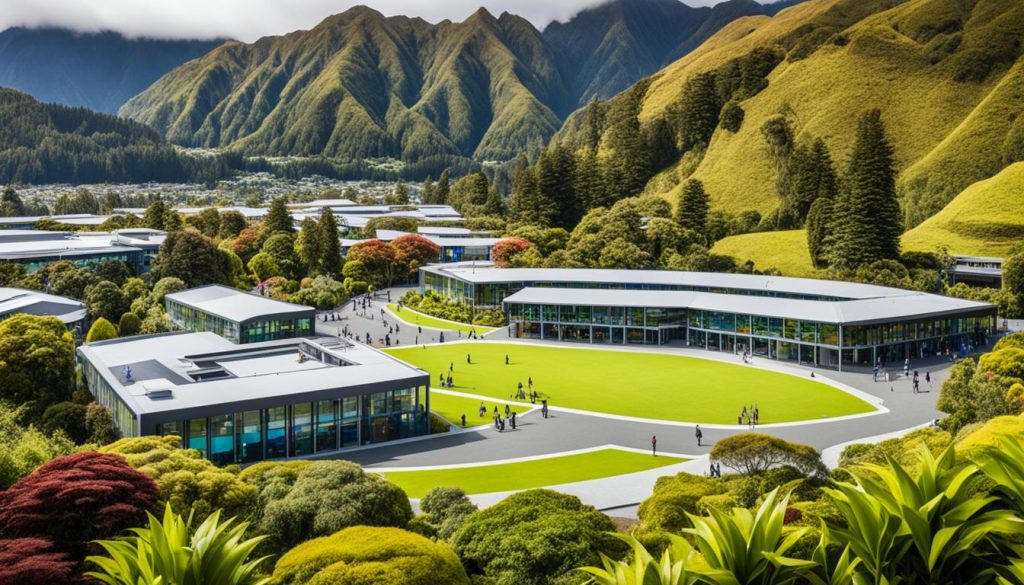Gaining a comprehensive understanding of the education system in New Zealand is crucial for those seeking quality education opportunities in the country. The New Zealand education system is well-regarded internationally, known for its student-centered approach and commitment to providing consistent, high-quality education at all levels. In this article, I will explore the different levels of education in New Zealand, highlight the advantages of the system, and discuss the policies that support it.
Key Takeaways:
- The education system in New Zealand is structured into three levels: early childhood education, primary and secondary education, and further education.
- New Zealand’s education system is ranked 7th in the world and is known for its high levels of literacy, mathematics, and science.
- Early childhood education is not compulsory in New Zealand, but approximately 96.8% of children attend ECE.
- Primary and secondary education in New Zealand is free for New Zealand citizens and permanent residents.
- The national curriculum in New Zealand focuses on foundation learning in literacy and numeracy and aims to develop well-rounded learners.
- The National Certificate of Educational Achievement (NCEA) is the national senior secondary school qualification in New Zealand.
- Higher education in New Zealand is highly regarded and offers a range of options, including universities, technical institutes, and private training establishments.
Early Childhood Education in New Zealand
Early childhood education (ECE) plays a crucial role in the development and preparation of children for their educational journey. In New Zealand, while ECE is not compulsory, approximately 96.8% of children attend ECE, highlighting its importance and widespread adoption.
ECE provides a nurturing environment that fosters the growth of essential skills and abilities in children. It focuses on building a strong foundation for future learning and helps children develop socially, emotionally, cognitively, and physically. By participating in ECE, children gain essential skills such as effective communication, problem-solving, and critical thinking, setting them up for success in their academic and personal lives.
There are various types of early childhood education services available in New Zealand, including kindergartens, playcenters, childcare centers, and home-based care. These services cater to different preferences and needs, ensuring that families can find an ECE setting that suits them best.
All early childhood education in New Zealand is guided by the Te Whāriki curriculum framework, which emphasizes holistic development and takes into account the unique cultural heritage of each child. Te Whāriki promotes a play-based approach to learning, encouraging children to explore, inquire, and engage in hands-on experiences that enhance their knowledge and understanding of the world around them.
“Play is the highest form of research.” – Albert Einstein
To ensure accessibility and affordability, the New Zealand government subsidizes early childhood education. This means that all children attending ECE for up to 6 hours a day receive financial support. Additionally, there is a higher funding subsidy called 20 Hours ECE available for children aged 3-5 years. This subsidy covers up to 20 hours of ECE per week, further reducing the financial burden on families.
Benefits of Early Childhood Education
Early childhood education in New Zealand offers numerous benefits that positively impact children’s development and future academic success. Some of the key advantages include:
- Enhanced social and emotional development
- Improved language and communication skills
- Development of foundational literacy and numeracy skills
- Stimulated curiosity and love for learning
- Enhanced problem-solving and critical thinking abilities
- Increased confidence and self-esteem
- Opportunities for cultural and social interaction
By investing in early childhood education, New Zealand recognizes the importance of providing a solid educational foundation for children. The holistic approach, combined with a focus on individual growth and cultural diversity, ensures that children are well-equipped to thrive and succeed in their educational journey.
Image: Early Childhood Education in New Zealand
Primary and Secondary Education in New Zealand
In New Zealand, primary and secondary education is accessible to all New Zealand citizens and permanent residents free of charge. The Ministry of Education has made schooling mandatory from the ages of six to sixteen, ensuring that every child has the opportunity to receive an education.
Primary education begins at Year 1 and extends through Year 8, providing a solid foundation for children’s learning journey. Secondary education encompasses Year 9 to Year 13, preparing students for further education or entry into the workforce.
Most children attend a local school based on their residential area. The education system in New Zealand offers a variety of options for parents and students, including state schools, state-integrated schools with a special character, and private schools.
In addition to the English-medium education offered in most schools, New Zealand also provides Māori-medium education. In these schools, subjects are taught in the Māori language for at least 51% of the time, embracing and preserving Māori culture and language.
Types of Schools
State Schools: These publicly funded schools follow the national curriculum and cater to a wide range of students.
State-Integrated Schools: These schools have a special character, often based on a particular religious or cultural ethos. They receive both government funding and additional contributions from parents or the community.
Private Schools: Private schools are independently funded and offer a variety of educational approaches. They may have different curriculum frameworks or offer specialized programs.
| Types of Schools | Description |
|---|---|
| State Schools | Publicly funded schools that follow the national curriculum. |
| State-Integrated Schools | Schools with a special character, receive government funding and additional contributions. |
| Private Schools | Independently funded schools with different curriculum frameworks and program offerings. |
Furthermore, New Zealand’s education system promotes inclusivity and diversity, providing equal educational opportunities for all students. The emphasis on personalized learning ensures that students can thrive and develop their full potential.
The National Curriculum in New Zealand
The national curriculum in New Zealand plays a crucial role in shaping education at primary and secondary schools. It provides a comprehensive framework for teaching and learning, emphasizing foundation skills in literacy and numeracy during primary education. The curriculum is widely recognized for its effectiveness in developing well-rounded learners who are equipped for success in the modern world.
English-medium schools in New Zealand follow the New Zealand Curriculum, which offers a broad range of subjects, including English, mathematics, science, social sciences, and the arts. This curriculum focuses on building essential knowledge and skills, promoting critical thinking, and fostering creativity. It also incorporates the principles of sustainability and cultural diversity to prepare students for global citizenship.
On the other hand, Māori-medium schools utilize Te Marautanga o Aotearoa, a curriculum tailored specifically for students in Māori-medium education. This curriculum is designed to honor and preserve the Māori language, culture, and values. It integrates te reo Māori (Māori language) throughout the subjects, providing a culturally responsive approach to education.
The national curriculum provides clear guidelines for teaching and assessment, ensuring consistency and high standards across schools. It supports teachers in developing engaging and effective lesson plans, incorporating modern teaching methodologies, and using assessment tools that focus on student progress and achievement.
The national curriculum in New Zealand aims to empower students with knowledge, skills, and values that will enable them to participate fully in society and make a positive contribution to the world.
The Key Features of the New Zealand Curriculum:
- Emphasis on foundation skills: The curriculum prioritizes the development of literacy and numeracy skills during primary education, setting a strong educational foundation for students.
- Integrated learning areas: It offers a balanced and interconnected range of subjects that encompass various disciplines, allowing students to explore multiple areas of interest.
- Inclusion and diversity: The curriculum recognizes and celebrates the diverse cultural identities of New Zealand students, promoting inclusivity, and fostering mutual respect.
- Critical thinking and problem-solving: It encourages students to think critically, ask questions, and solve complex problems, equipping them with valuable skills for lifelong learning.
- Cultural and environmental sustainability: The curriculum emphasizes the importance of cultural heritage and environmental sustainability, guiding students towards responsible and ethical decision-making.
Overall, the national curriculum in New Zealand provides a robust educational framework that prepares students for future success, while also nurturing their individual talents and aspirations.
National Certificate of Educational Achievement (NCEA)
The National Certificate of Educational Achievement (NCEA) is the national senior secondary school qualification in New Zealand. It is assessed during Years 11-13 and offers students the opportunity to achieve NCEA at three levels in a wide range of courses and subjects. The NCEA is recognized not only for university entrance but also for further education and employment prospects.
The NCEA is a flexible and comprehensive qualification that allows students to tailor their learning to their interests and strengths. It provides a framework for the assessment of knowledge, skills, and understanding across a variety of subjects, allowing students to showcase their abilities in different areas.
Students can achieve the NCEA through a combination of internal and external assessments. Internal assessments are conducted by the students’ own teachers and are based on the coursework completed throughout the year. External assessments, on the other hand, are administered by the New Zealand Qualifications Authority (NZQA) and are usually in the form of exams or portfolios.
The NCEA offers three levels of achievement: NCEA Level 1, NCEA Level 2, and NCEA Level 3. Each level builds upon the previous one, with increasing complexity and depth of knowledge required for higher levels. Students can also earn merit or excellence endorsements for specific subjects and levels, further recognizing their academic excellence.
The NCEA is an internationally recognized qualification that opens doors to higher education institutions both in New Zealand and abroad. It provides students with a solid foundation for future academic pursuits and career pathways.

Learning Support in New Zealand
In New Zealand, the education system prioritizes providing additional learning support to students in every local early childhood center or school. This support is designed to cater to individual needs and foster the success of students, educators, families, and whānau. The goal is to ensure that every student has equal opportunities to thrive academically and personally.
Learning support in New Zealand encompasses a wide range of services and resources. It may involve specialized interventions, assistance with disabilities or learning difficulties, and the provision of targeted resources to address specific needs. The approach is collaborative, involving close communication and coordination between educators, families, and support professionals.
One of the key focuses of learning support is early intervention. Identifying and addressing learning challenges at an early stage can significantly improve outcomes for students. Schools and early childhood centers work closely with families to develop individualized plans and strategies to support the unique needs of each learner.
Key Aspects of Learning Support in New Zealand:
- Specialized interventions tailored to individual needs
- Assistance and support for students with disabilities or learning difficulties
- Collaboration among educators, families, and whānau
- Early intervention to address learning challenges
- Provision of targeted resources
“Learning support in New Zealand ensures that every student has equal opportunities to thrive academically and personally.”
By providing comprehensive learning support, New Zealand aims to create an inclusive and supportive educational environment where all students can reach their full potential. Whether it’s specialized resources, interventions, or assistance with disabilities or learning difficulties, the focus remains on empowering students to achieve academic success while fostering their overall well-being.
Enrolling in School in New Zealand
Enrolling in school in New Zealand is a straightforward process that allows parents to choose the school that best suits their preferences for their child’s education. Here’s how to get started:
- Contacting the School: To begin the enrollment process, parents need to directly contact the school of their choice. They can usually find the contact information on the school’s website or by searching online directories. Schools are generally welcoming and happy to assist families with the enrollment process.
- Enrollment Zones: Many schools in New Zealand have enrollment zones. These are geographic boundaries set by the school that determine which students are guaranteed a place in the school. If you live within the school’s enrollment zone, your child will have priority admission. It’s essential to check if your address falls within the enrollment zone of your preferred school.
- Public, State-Integrated, or Private Schools: New Zealand offers a variety of school options, including public, state-integrated, and private schools. Public schools are funded by the government and are open to all students. State-integrated schools have a special character, such as religious or philosophical, and are partly funded by the government. Private schools are funded by tuition fees and have their selection criteria. Parents can choose the type of school that aligns with their educational philosophy and values.
Enrolling your child in a school in New Zealand ensures they have access to quality education and a supportive learning environment. Whether you choose a public, state-integrated, or private school, the emphasis on providing a well-rounded education remains consistent across the education system.
Comparison of Public, State-Integrated, and Private Schools
| School Type | Funding | Curriculum | Enrollment |
|---|---|---|---|
| Public Schools | Funded by the government | New Zealand Curriculum | Open to all students |
| State-Integrated Schools | Partly funded by the government | Blend of New Zealand Curriculum and special character | Open to all students |
| Private Schools | Funded by tuition fees | Varies (may follow New Zealand Curriculum or an alternative) | Admission criteria set by the school |
Each school type offers unique features and advantages, allowing parents to choose the educational environment that aligns with their child’s needs and aspirations. It’s important to consider factors such as location, curriculum, extracurricular activities, and values when making an enrollment decision.
Primary and Secondary School Schedule in New Zealand
In New Zealand, primary and secondary schools follow a structured schedule that ensures a balanced learning experience for students. Understanding the school schedule is essential for both parents and students to plan their daily routines effectively.
Primary and secondary schools in New Zealand typically operate from 9 AM to 3:30 PM, allowing students to engage in a variety of academic and extracurricular activities. The school day is organized into different periods, each dedicated to specific subjects and learning opportunities.
The school year is divided into four terms, with two-week breaks between each term. This scheduling system helps students to stay motivated and refreshed throughout the year, with regular breaks allowing them to recharge and maintain focus.
Schools in New Zealand adhere to the schedule set by the Ministry of Education, ensuring consistency and uniformity across the country. This coordination enables seamless transitions for students who may need to change schools due to relocations or other circumstances.
The summer break in New Zealand lasts for six weeks, providing students and teachers with ample time to relax and pursue personal interests before the new school year begins.
Understanding the primary and secondary school schedule in New Zealand allows students and parents to plan their routines effectively, balancing academics, extracurricular activities, and personal time.
“A well-structured school schedule in New Zealand ensures that students have access to a comprehensive education while providing them with opportunities for personal growth and development.”
For a visual representation of primary and secondary school schedule in New Zealand, refer to the table below:
| Term | Duration | Break |
|---|---|---|
| Term 1 | 10 weeks | 2 weeks |
| Term 2 | 10 weeks | 2 weeks |
| Term 3 | 10 weeks | 2 weeks |
| Term 4 | 10 weeks | 6 weeks (Summer Break) |
Higher Education in New Zealand
New Zealand offers a diverse range of higher education options, making it an attractive destination for students seeking quality tertiary education. The country is home to several universities, technical institutes, and private training establishments that cater to a wide range of academic and vocational interests.
One notable aspect of higher education in New Zealand is the presence of eight state-funded universities. These universities offer a variety of degrees and courses in different subjects, ensuring that students have ample choices to pursue their academic and career goals. From arts and humanities to sciences and engineering, these universities provide a comprehensive education across various disciplines.
Tertiary education in New Zealand is known for its quality and international recognition. The universities adhere to rigorous academic standards, ensuring that graduates receive a well-rounded education that prepares them for the global job market. Studying at a New Zealand university not only provides students with valuable knowledge and skills but also enhances their future prospects.
To give you a better understanding of the higher education landscape in New Zealand, here is a table highlighting the state-funded universities:
| University | Location |
|---|---|
| University of Auckland | Auckland |
| University of Otago | Dunedin |
| University of Canterbury | Christchurch |
| Victoria University of Wellington | Wellington |
| University of Waikato | Hamilton |
| Massey University | Palmerston North |
| University of Technology, Auckland (AUT) | Auckland |
| Lincoln University | Lincoln |
These universities are renowned for their academic excellence, cutting-edge research, and world-class faculty. They provide a supportive learning environment that fosters growth and innovation. Furthermore, international students are welcomed with open arms, adding diversity to the campuses and promoting cross-cultural understanding.
Overall, higher education in New Zealand offers ample opportunities for students to pursue their passions and gain valuable qualifications. Whether you’re interested in arts, sciences, business, or any other field, the country’s universities are equipped to provide a rewarding educational experience that prepares you for success.

Outdoor Education in New Zealand
School camps play a significant role in the education system of New Zealand, providing students with valuable opportunities for outdoor education and experiential learning. These camps are organized at various levels, starting from upper primary school and extending to secondary school. They are designed to not only offer students a break from the traditional classroom setting but also to develop essential skills such as teamwork, leadership, and outdoor techniques.
During these camps, students engage in a range of activities that promote personal growth and foster a deeper connection with nature. They may include hiking trips through scenic landscapes, fishing excursions in pristine rivers and lakes, and various outdoor sports like rock climbing, kayaking, and archery. These hands-on experiences allow students to learn valuable life skills while fostering a sense of adventure and exploration.
Furthermore, school camps often provide opportunities for students to relax and bond with their peers through activities such as campfire stories, group games, and team challenges. These experiences help foster a sense of camaraderie and cooperation, nurturing important social skills and building lasting friendships.
Outdoor education in New Zealand not only enhances physical fitness but also promotes mental well-being. It offers a break from daily routines, encouraging students to step out of their comfort zones and overcome challenges in a natural environment. This type of education is considered vital for personal and social development, as it fosters resilience, self-confidence, and problem-solving skills.
In conclusion, school camps provide a unique platform for outdoor education in New Zealand, offering students memorable experiences and valuable life skills. These camps contribute to a well-rounded education and complement the academic curriculum, allowing students to broaden their horizons and develop a deeper appreciation for the natural beauty of New Zealand.
Conclusion
The education system in New Zealand offers numerous advantages and opportunities for students seeking a high-quality education. With its emphasis on practical and academic achievement, the system ensures continuous learning progression from early childhood to higher education.
New Zealand’s education system is internationally recognized for its impressive levels of literacy, mathematics, and science. This achievement can be attributed to the student-centered approach and the government’s commitment to providing consistent, high-quality education at all levels.
One of the notable strengths of the New Zealand education system is its inclusivity and support for all students. From early childhood education to higher education, there are comprehensive resources and programs available to cater to individual needs and learning styles. This ensures that every student has the opportunity to thrive and succeed.
Whether it’s the free education for New Zealand citizens and permanent residents, the range of educational institutions, or the focus on outdoor education, New Zealand offers a well-rounded and enriching educational experience. Students are equipped with the skills and knowledge to navigate the challenges of the future, making them highly valued in the global job market.
FAQ
What is the education system like in New Zealand?
The education system in New Zealand is student-centered and provides continuous learning progression from early childhood to tertiary education. It is structured into three levels: early childhood education, primary and secondary education, and further education.
Is early childhood education compulsory in New Zealand?
No, early childhood education is not compulsory in New Zealand. However, approximately 96.8% of children attend early childhood education, as it helps them develop important skills and prepares them for school.
What types of early childhood education services are available in New Zealand?
There are different types of early childhood education services in New Zealand, including kindergartens, playcentres, home-based care, and childcare centers. All learning in early childhood education is guided by the Te Whāriki curriculum framework.
Is primary and secondary education free in New Zealand?
Yes, primary and secondary education is free for New Zealand citizens and permanent residents. Schooling is compulsory for children aged 6-16.
What are the different types of schools in New Zealand?
In New Zealand, there are state schools, state-integrated schools with a special character, private schools, and Māori-medium schools where subjects are taught in the Māori language for at least 51% of the time.
What is the national curriculum in New Zealand?
The national curriculum in New Zealand covers subjects taught at primary and secondary schools. English-medium schools use the New Zealand Curriculum, while Māori-medium schools use Te Marautanga o Aotearoa. The curriculum aims to develop well-rounded learners and provides guidelines for teaching and assessment.
What is the National Certificate of Educational Achievement (NCEA)?
The National Certificate of Educational Achievement (NCEA) is the national senior secondary school qualification in New Zealand. It is assessed during Years 11-13 and students can achieve NCEA at three levels in a wide range of courses and subjects. NCEA is recognized for university entrance and further education.
Are there learning support services available in New Zealand?
Yes, New Zealand provides additional learning support in every local early childhood center or school. This support is tailored to individual needs and aims to assist students, educators, families, and whānau.
How can I enroll my child in school in New Zealand?
To enroll in school in New Zealand, parents need to directly contact the school of their choice. Many schools have enrollment zones, guaranteeing a place for children who live in the school’s zone. Children can attend public, state-integrated, or private schools based on their preferences.
What is the school schedule like in New Zealand?
Primary and secondary schools in New Zealand typically operate from 9 AM to 3:30 PM. The school year is divided into four terms, with two-week breaks between each term. Schools follow the schedule of the Ministry of Education, with a summer break lasting 6 weeks.
What higher education options are available in New Zealand?
New Zealand offers a range of higher education options, including universities, technical institutes, and private training establishments. There are eight state-funded universities in New Zealand, offering a variety of degrees and courses in different subjects.
Are outdoor education and school camps part of education in New Zealand?
Yes, school camps and outdoor education are an integral part of education in New Zealand. They are held at various levels, starting from upper primary school, and aim to develop skills such as teamwork, leadership, and outdoor techniques.

